Up With Jesus Down With $anta
By Richard B. Muhammad and Charlene Muhammad -Final Call Staffers- | Last updated: Dec 20, 2016 - 11:25:27 AMWhat's your opinion on this article?
Calls and support for spending boycotts surge as 2016 comes to an end
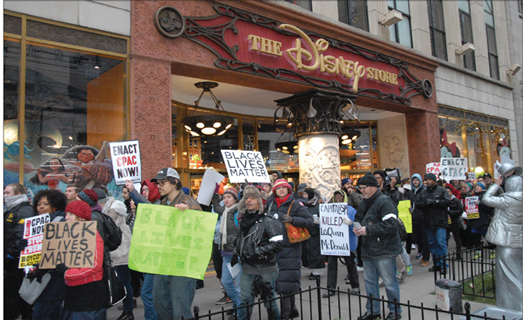
Demonstrators took to the streets of downtown Chicago to call attention to continued injustice through spending boycotts during the Christmas holiday season. Photos: Haroon Rajaee
|
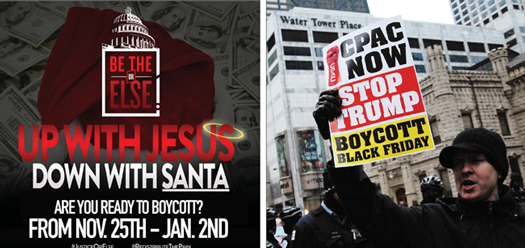
Protestor holds sign near Water Tower Place in Chicago to stop Trump and boycott Black Friday.
|
Holiday decorations are up, Christmas songs ring out in stores across the country, and “cha-ching” sounds emanate from cash registers, but don’t be fooled, because many fed up with injustice, police violence and racism are rejecting spending, commercial overkill and debt this holiday season.
Echoing a call by the Honorable Minister Louis Farrakhan of the Nation of Islam, many Black activists and others agreed it’s time to boycott as Season 2 of “Up With Jesus! Down With Santa!” moved forward. The goal is to curb shopping until Jan. 2, 2017.
By strategically engaging in economic withdrawal, Blacks can begin putting power behind their demands and build a new and better reality, Minister Farrakhan stated in the run up to Justice or Else!, the 20th Anniversary of the Million Man March in Washington, D.C. in October 2015.
“The widespread death, rising racism, mob attacks and police brutality on Blacks coupled with economic deprivation and stark poverty, requires that something must be immediately done to address and correct the condition. The failure of the U.S. government to give justice to its former slaves requires that we present ourselves in unity to make the demand for Justice or Else!” Minister Farrakhan stated.
“Let us start by not spending money we either don’t have or cannot afford during the Christmas season. Why should we make the merchants rich by their wicked manipulation and exploitation of the emotions of children, parents, families and those we love, with their pagan practices that have nothing to do with the celebration and observance of the righteous servant of God, Jesus?”
Take the day, the entire season, to give thanks to God for the gift of Jesus, share that great gift of God and what he taught, Minister Farrakhan instructed.
Advocates and organizers had been waging online and on the ground battles for justice with petitions and protests, and those have been effective, but the impact has grown with a focus on Main St. and merchants.
Minister Farrakhan, for example, called on Blacks to pool their $1 trillion purchasing power to build institutions and create jobs for their people.
Justice or Else! demands an immediate end to police brutality and mob attacks and justice for the Native American Indians, the Mexican and Latinos, for women, the poor, the incarcerated, and veterans, and, it means land, said the Minister.
“I personally believe that 2017 will be the best year for Black people, maybe ever, because to me the most exciting part is we have the ability now to communicate with each other without asking for White people’s permission,” said Dr. Boyce Watkins, a Black author, economist, political analyst and entrepreneur.
“I don’t think Donald Trump is going to be as friendly in certain elements of political justice as the Obama administration was,” he explained. “Unfortunately, there are a lot of Black people who are motivated by fear, and there’s almost nothing they’re afraid of more right now than Donald Trump and the Trump administration. So now they realize all they’ve ever had was people like Minister Louis Farrakhan and others, who can provide a type of leadership that’s far more authentic to what Black people are trying to do.”
Economically, Blacks are gaining by leaps and bounds every year, due to the development of technology and awareness, he said. They’re moving closer to a world in which Blacks will spend hundreds of billions more money in their own communities, support each other, and connect emotionally, psychologically, politically and intellectually, Dr. Watkins predicted.
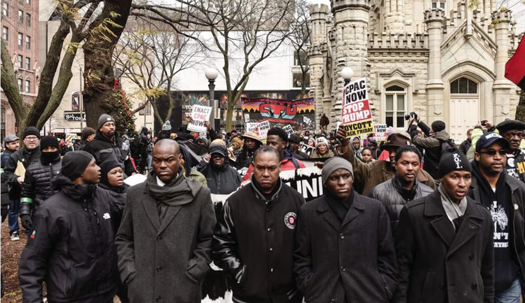
Members of the Fruit of Islam (F.O.I.) the men of the Nation of Islam, form a line in downtown Chicago to form a barrier of protection between protestors and police during Black Friday demonstrations in 2016. Photos: Haroon Rajaee
|
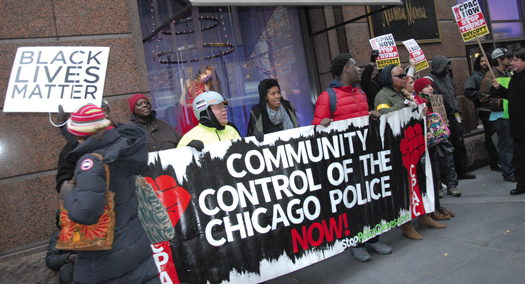
Chicago has been a flashpoint of demonstrations against police misconduct and brutality.
|
‘Everybody boycotts us’
“I think that we should certainly boycott all the time because everybody boycotts us. Trade is supposed to be a two-way street, and Americans have turned it into being a one-way street. They look at us and say ‘Negroes give us all your money, and we will give you nothing,’ and that doesn’t make any sense,” said Dr. Watkins.
Boycotts are a natural reaction for anyone who has a grievance, Dr. Watkins continued. But, he said, even deeper than that Blacks could consider alternative language that would achieve the same result. Rather than motivating ourselves by rejecting something that other people are doing, we should motivate ourselves by accepting what we’re doing, he argued.
“I don’t really get up every morning thinking ‘I’mma go boycott White folks.’ I wake up every day thinking, ‘I’mma go love me some Black people, and after I get done loving my own people, who need so much love, I ain’t got no more love for nobody else,’ ” Dr. Watkins said.
“It’s like taking care of your own children. Does a mother get up in the morning and say, ‘I’mma boycott babysitting other people’s kids’ or does she say, ‘my kids need the best that I can offer, and maybe if I have something left, I might do something for your children, but I got seven kids myself, and I ain’t got time for all of that.’ ”
Dr. Watkins said, “It’s not really radical for us to do this. … We’re claiming back to normalcy, because we’ve been in such an abnormal, such an abusive, such a terroristic environment, we’ve really endured the equivalent of a Nazi holocaust every year for 400 years, and even people who’ve gone through what we’ve gone through for just five or six years or were traumatized for an entire century, so imagine what we’re feeling?”
Perhaps people could come up with another term for boycott, Dr. Watkins said.
There is one: it’s called the Buy Black Movement.
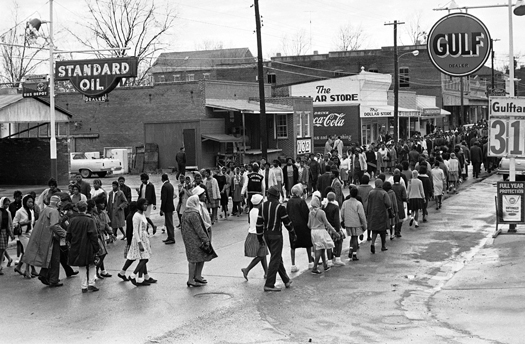
About 500 Blacks make a circle turn in downtown Fayette, Mississippi, Dec. 24, 1965, during a “Black Christmas” march. The march was led by Mississippi NAACP field director Charles Evers who headed a boycott of Fayette stores. Photo: AP/Wide World photos
|
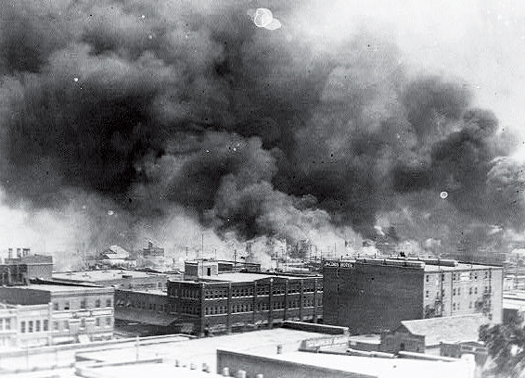
Smoke billowing over Tulsa, Oklahoma, during 1921 race riots. Photo: Library of Congress
|
The movement recognizes Blacks are linked to great economists, even post-slavery, such as Black Wall Street in Tulsa, Oklahoma. The Black business owners’ economy boasted $2 million a day, that today would be the equivalent of $25 billion, said Student Minister Tony Muhammad, the Nation of Islam’s Western Region Representative.
A White mob burned the area in Tulsa’s Greenwood District to the ground in 1921 during race riots. The only remnant of Black Wall Street is a memorial brick holding all the names of the businesses burned, he said.
“I didn’t realize that that area was so vast, it was so thriving, that we had our own transit system. There was a brother who was manufacturing and making buses. They were manufacturing, yes, their own cars. Black people, their own airplanes. Black Wall Street, they had hospitals. They had schools. They had manufacturing plants … in every direction, they owned it all. Banks, theaters,” Tony Muhammad said.
The Millennials love the Buy Black Movement because they view this as an opportunity to hit back at oppression, he explained.
In addition to supporting Black business, there are entrepreneurs focused on creating Black businesses. Tag Team Marketing is one of those efforts and part of the Buy Black Movement.
Founded by Delxino and Deborah Wilson De Briano, Tag Team focuses on building Black economic power. “We have come to realize that the only way our race will advance economically is by Black people buying from Black-owned businesses, on a massive scale,” Tag Team Marketing said.
“That means we aim to help create so many prosperous Black-owned businesses, and create levels of production so high, that the Black community becomes permanently wealthy and nothing, not even a bad economy, can bring us down,” the company added.
“I think it’s important to highlight the building work that people are doing, so not just the disruption,” said Dr. Melina Abdullah, an organizer with Black Lives Matter Los Angeles and chair of the Pan African Studies Department at California State University Los Angeles.
Disrupt and build: A dual strategy
Black Lives Matter uses a disrupt and build model, she said, and a lot of what’s been covered has been on the disruption, and that’s important as it confronts White supremacist, patriarchal capitalism.
“We have to disrupt it. If we think about what this system is, the election of Donald Trump really embodies that system, and so we have to be active. We have to engage. We have to disrupt, and, at the same time, we have to build alternative models,” Dr. Abdullah said.
“If we think about what we’re doing now and work backwards, we are in a period of Black XMAS, where we’re saying we have to divest from White corporations while at the same time build our own economic power,” she said.
Their website, Backing Black Business, was scheduled to go live Dec. 12. It comes in part out of a month-long survey of national Black-owned businesses. It will feature an interactive map highlighting Black-owned businesses and Black-led community organizations.
“We also want to shake people from this idea that we have to spend, spend, spend. We can also use our dollars to invest in Black communities,” she said.
Handing out economic punishment is a way to strike at the heart of America—hit businesses who influence and bankroll politicians to press for change.
Groups like the Justice League of New York, Justice Or Else! Chicago, and Black Lives Matter in Los Angeles took to the streets over the Black Friday weekend. “When we’re talking about the economic shutdown, we’re talking about stopping corporations from getting our money, right? So, we’ve got to go to the stores that don’t care about us; don’t care about people of color,” said Carmen Perez, co-founder of the Justice League of New York.
In Chicago, activists and demonstrators disrupted shopping on the Michigan Avenue retail strip dubbed “The Magnificent Mile” the day after Thanksgiving.
According to the Chicago Tribune, the Black Friday protests in Chicago had a significant impact, to the tune of a 25-50 percent drop in retail sales for various retailers.
“We were down a lot,” Sarah Midoun, a sales associate at Aldo shoe store, told the newspaper. “We were budgeted to make $37,000 but we only did $19,000—customers told us they were concerned.”
Other stores affected included Men’s Warehouse, which made less than $10,000 on Black Friday this year compared to $19,000 last year. High-end shoe retailer Stuart Weitzman projected to make as much as $50,000 this year, saw sales more than $20,000 short of the goal. Garmin, a manufacturer of GPS devices, said its in-store Black Friday sales were down by as much as 40 percent because of the Michigan Ave. protests.
According to the National Retail Federation, consumers spent less money this year than they did in 2015. Also, while online shopping went up, brick-and-mortar operations saw a decrease of three million in-store shoppers this year, compared to last. Research firm ShopperTrak revealed that nationwide, overall in-store sales fell 10 percent, from $11.6 billion in 2015 to $10.4 billion in 2016.
The National Retail Federation reported consumer spent about $10 less on average in 2016—about $290 this year compared to nearly $300 in 2015. The federation also attributed spending success to discounted sales, with about 36 percent of 2016 shoppers saying all of their purchases were on sale versus 32.5 percent of shoppers last year. Guns were also a big seller, according to sales surveys.
Strategic and socially conscious shopping
Cassiopeia Sledge of TheBlackMall.com, a Chicago-based website that sells Black-owned goods and services, sees change on the horizon. “There’s been a surge of interest in people buying Black and [doing business with] pop-up shops ready to serve them,” she said. Her “Buy Black” message may have once seemed somewhat radical, but the tide has turned, she said.
Anti-Trump activists have joined the fray, with an app designed to highlight companies owned by or connected with controversial President-elect Donald Trump. The #GrabYourWallet movement, launched in October, includes approximately 65 companies that can be targeted for an alignment the Trumps. Some of the most notable companies included on the spreadsheet were Amazon, Nike, New Balance, Home Depot, Sears, Nordstrom and Bloomingdales.
In his article, “Want to Protest Trump? Nix Black Friday, #CancelXmas Shopping,” Tom Ewing encouraged protestors to forget taking to streets to denounce the election of Donald Trump to the presidency. Mr. Ewing wrote that the only way to protest Trump is to stop shopping.
“It might be the only weapon left,” he said.
The Democratic Coalition Against Trump created a “Boycott Trump” app which lists businesses that have been linked to Trump and helps people avoid spending money with those companies.
As the holiday season draws to a close, the deals and the door busters are liable to grow and the ads will tug at heart strings, hoping to undo purse strings. But if you reject the hype, you can save yourself post-holiday debt blues and strike a blow for freedom.
As activists and advocates have declared: We’ve got to stop financing our own oppression.
(Final Call staff contributed to this report.)
INSIDE STORIES AND REVIEWS
-
-
About Harriett ... and the Negro Hollywood Road Show
By Rabiah Muhammad, Guest Columnist » Full Story -
Skepticism greets Jay-Z, NFL talk of inspiring change
By Bryan 18X Crawford and Richard B. Muhammad The Final Call Newspaper @TheFinalCall » Full Story -
The painful problem of Black girls and suicide
By Charlene Muhammad -National Correspondent- » Full Story -
Exploitation of Innocence - Report: Perceptions, policies hurting Black girls
By Charlene Muhammad -National Correspondent- » Full Story -
Big Ballin: Big ideas fuel a father’s Big Baller Brand and brash business sense
By Bryan Crawford -Contributing Writer- » Full Story






 Click Here Stay Connected!
Click Here Stay Connected!








